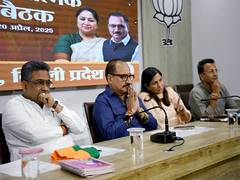India making border infra robust with seriousness it deserves: Jaishankar
Gandhinagar, Dec 23 (PTI) The country is making its border infrastructure robust with the seriousness it deserves to strengthen national security, with the construction of roads, bridges and tunnels along the China border at a much faster pace compared to what was achieved in previous decades, External Affairs Minister S Jaishankar said here Saturday.
Despite the setback India faced in 1962, in the war with China, due to “complacency” and “neglect” for infrastructure along the border areas, it failed to learn a lesson until the government under Prime Minister Narendra Modi started approaching the domain of security with the seriousness it deserves, he said.
Speaking at the third convocation of Rashtriya Raksha University (RRU), the Union minister said India has deeply embedded security factors into its diplomatic strategy. “Acquiring and developing weapons, and building related capacities have not only been at the core of our defence policies, but also of our diplomacy,” he said.
Even when logistics has been a key to security and warfare, it remained a neglected dimension till recently, he said.
“Take our border areas facing China as an illustration. And let the figures speak for themselves. Today, road construction is 2x, bridging and tunnelling 3x, and the border infrastructure budget 4x compared to what was the commitment and achievement of the last decades,” he said in his address to graduating students of RRU.
“But it is not just the length and number of the roads, tunnels and bridges, but the consequences that they have for our operational capabilities. In the last decade, we have seen all-weather connectivity to Ladakh and to Tawang, focus on access to critical passes along the LAC (line of actual control), and the construction, in fact, of the world’s highest motorable road,” he said.
He said that “complacency” and “neglect” in the domain of security can cost the nation dearly. “We saw that graphically in 1962. But sadly, its lessons were not apparently learned by those who came later. It is only now that we are approaching border infrastructure with the seriousness that it deserves,” he added.
The application of new technologies and construction techniques has yielded visible results, accompanied by a reform of entities like the Border Roads Organisation (BRO), he said.
Jaishankar said that even by the traditional metrics of security assessments, India faces exceptional challenges.
“Strenuous efforts have since been made, especially in the last decade, to correct the shortcomings of the previous decades. The overall development of our national strengths that we have seen since 2014 have clearly had positive repercussions in the security field,” he said.
Focusing on acquiring and developing weapons and building related capacities has not only been at the core of India’s defence policies, but even of its diplomacy, he said.
“Indeed, a large part of our geopolitical calculations rests on which nations are likely to be reliable partners during times of stress. We, therefore, embed the security factor deeply into our strategy, and into our diplomacy,” he said.
“We have long been conversant with the concept of dual technology that has extended even more to encapsulate critical and emerging technologies. It has been a signal achievement of Indian diplomacy that we have been successful in forging relationships with multiple and often competing powers to our side,” he said.
The external affairs minister said that economic and technological capacities go hand in hand, and both are equally crucial for India’s security. The progress of nations and history is to a great measure reflected in the progress of technology, he said.
“In the post-1992 reform era, we understandably opened up our economy, but we did not pay adequate attention to safeguarding and upgrading our manufacturing. Without robust manufacturing, a nation like India can never be updated on technology, let alone emerge as a leader in a particular domain,” he said.
Reversing the indifference of the past, India has given thrust to manufacturing through various schemes, Jaishankar said.
With progress comes accompanying downside and increasing vulnerabilities, such as cyber security in the digital age, he said.
“We have since moved on to debates about deepfakes using AI (artificial intelligence). Another is the impact of fake news and disinformation that can shape mass opinion in a dramatic way. The COVID-19 pandemic, too, is a reminder of how exposed we are in a globalised environment,” he said.
India is also addressing the concern for external dependence in terms of equipment required for building infrastructure or weaponry for its armed forces that has long dogged it, he added.
Earlier, speaking on the sidelines of the event, Jaishankar expressed concern over the vandalism of a Hindu temple with anti-India graffiti in the US and said extremists and separatist forces outside India should not get such space.
“I have seen the news. As you know, we are concerned about this. Extremists and separatist forces outside India should not get space. Our consulate has lodged a complaint with the (US) government and the police there over whatever happened, and I believe the matter is being inquired,” Jaishankar said in response to a query about the incident.
The police department in Newark, California said that approximately 8.35 am on Friday, they received a report of graffiti at Shri Swaminarayan Mandir Hindu temple. According to images posted on social media, the word ‘Khalistan’ was spray-painted on a signpost outside the temple along with other objectionable graffiti.






